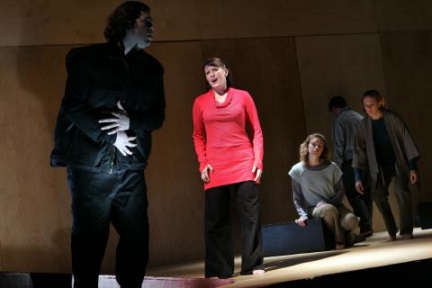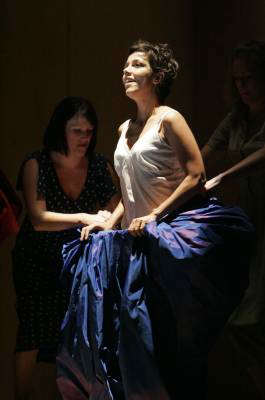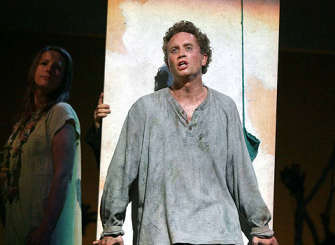|
Editorial Board
Melanie
Eskenazi
Webmaster: Len Mullenger
|
Seen and Heard Opera Review English Touring Opera in Exeter: Carissimi Jepthe, Purcell Dido and Aeneas and Monteverdi Orfeo, Northcott Theatre, Exeter UK 26-28. 10. 2006 (BK)
Carissimi's Jepthe
The first of ETO's two annual visits
to Exeter for this season brought the company's eagerly
awaited Autumn Baroque Tour to the South West. An impressive
series of relative rarities combined a double bill of
Jephte and Dido and Aeneas with performances
of Monteverdi's Orfeo, Handel's Tolomeo
and Cavalli's Erismena as well as offering a workshop
on baroque singing for amateurs, and a session of bawdy
ballads performed in a local pub.
Using only eight singers for all the solo roles and the choruses brought a welcome transparency to this attractive music and ensured that ensemble was carefully maintained throughout. Baritone David Stout made a strong and stricken Jephte and countertenor Iestyn Morris sang particularly well as Historicus. Jane Harrington as Filia, delivered a heartfelt and extremely moving closing solo.
Joana Thome as Dido The same eight singers were joined by Argentinian mezzo Joana Thome (Dido) for Dido and Aeneas. Director Helen Eastman provided a spare but effective setting which featured no props at all other than some piles of costumes at the back of the set which were used by the cast and chorus as they changed roles from being commentators to participants in the drama. Most of the costumes were modern but both Aeneas and Dido appeared in seventeenth century dress to emphasise the action in Dido's court. In the sorceress's scenes, the cast wore a variety of grotesque outfits and masks which clearly pointed up the contrasts between the court scenes and the kingdom of dark magic. When coupled with the excellent lighting plot, these simple devices made for a visually arresting presentation which worked very well indeed.
The small cast sang all of the the ensembles
besides providing the solo roles; Jane Harrington made
a caring and sympathetic Belinda, Patricia Orr was a powerful
and dramatic Sorceress and Iestyn Morris was still in
fine voice as the Spirit. As Aeneas, David Stout was solemn
yet wholly dignified and Joan Thome's sensitive Dido was
deeply moving even though she seemed troubled by English
pronunciation during, 'When I am laid in earth.'
Hal Cazalet as Orfeo
Following
up his success in presenting
The Cunning Little Vixen in
2004 as the portrayal of a community staging a folk play(review)
James Conway has used a similar strategy to produce
Monteverdi's Orfeo. In Mr. Conway's view, Orpheus’
journey into the underworld to retrieve Eurydice can be
thought of a shamanic initiation but for reasons best
known to himself, he has a group of people dressed as
modern day hippies re-enact it within a bleak and barren
landscape. It's all a little odd, especially at the end
after Apollo invites the unsuccessful Orpheus to join
him on Olympus. Then, the elected hero’s collaborators
in the enactment put him to death by stoning, and a bare
tree at the back of the stage sprouts the same green gloves
which had earlier represented Orpheus's lute. Quite what
Mr. Conway has in mind with this production - he seems
to have confused a shaman's journey of self-discovery
with a representation of the 'King for a Day' rituals
mentioned in Frazer's Golden Bough - remains
unclear even though he says that he is paying homage to
an alternative ending to Monteverdi's 1607 scenario in
which Orpheus is torn apart by the Maenads.
The singing was a little uneven too. Hal Cazalet was generally powerful enough to do justice to Orfeo, but seemed never to be quite on his best form. Katherine Manley (as Eurydice) sang clearly and both Joana Thome as the Messenger/Prosperina and David Stout (Pluto) impressed yet again. The performance lacked the energy that was evident two nights earlier however, and I came away feeling that ETO's entirely laudable vision for this series had overstretched its resources slightly.
Pictures © English Touring Opera
Back to the Top Back to the Index Page |
| ||
|
||||





